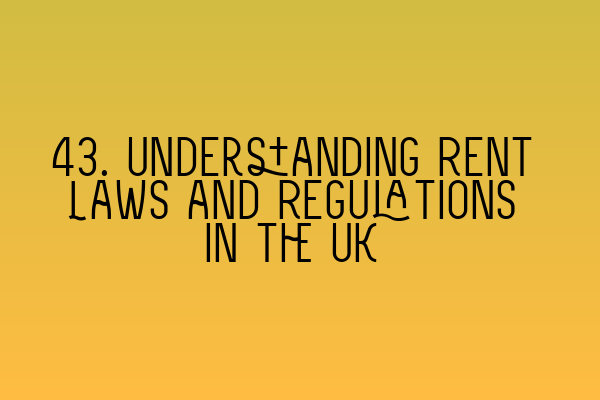Understanding Rent Laws and Regulations in the UK
As a property owner or tenant in the UK, it is crucial to have a solid understanding of rent laws and regulations. These laws are designed to protect both landlords and tenants and ensure that the rental market operates smoothly and fairly. Whether you are a landlord looking to properly manage your property or a tenant seeking your rights, knowing the regulations will help you navigate the sometimes complex world of renting.
Types of Tenancy
Before we delve into the specifics of rent laws, let’s first understand the different types of tenancies that exist in the UK. The two main types of tenancies are:
- Assured Shorthold Tenancy (AST): This is the most common type of tenancy in the UK. It usually grants tenants a minimum of six months’ security of tenure. ASTs typically have a fixed term, after which the landlord may decide to renew the tenancy or serve notice.
- Assured Tenancy: Assured tenancies offer tenants more security as they provide long-term tenancy rights. This type of tenancy can only be granted on certain conditions set out in the Housing Act 1988.
Now that we have a basic understanding of the types of tenancies, let’s discuss some key rent laws and regulations that both landlords and tenants should be aware of.
Rent Deposit Protection
One crucial aspect of renting in the UK is the protection of the tenant’s deposit. Landlords are legally required to protect a tenant’s deposit in a government-approved tenancy deposit scheme. This protects the deposit from being unfairly withheld at the end of the tenancy and helps resolve any disputes that may arise. Failure to protect a tenant’s deposit can result in severe penalties for landlords.
For more information on deposit protection and the specific schemes available, you can refer to the SQE 1 Practice Exam Questions article.
Rent Increases
Landlords have the right to increase rental prices, but they must follow specific procedures to ensure fairness. The frequency and amount of rent increases depend on the terms agreed upon in the tenancy agreement. However, landlords cannot increase rent arbitrarily or without proper notice. It is essential to consult the tenancy agreement and follow the legal procedures to avoid any disputes.
For more detailed information on the procedures regarding rent increases, you can explore the SQE 1 Practice Mocks FLK1 FLK2 article.
Repairs and Maintenance
Landlords have an obligation to ensure that the rental property is habitable and in a good state of repair. This includes taking care of essential maintenance, such as plumbing, heating, and electrical issues. Tenants must report any necessary repairs promptly, and landlords should address them in a reasonable timeframe. Failure to fulfill maintenance obligations can lead to legal action from tenants.
For more guidance on the rights and responsibilities of landlords and tenants regarding repairs and maintenance, you may refer to the SQE 2 Preparation Courses article.
Eviction and Termination of Tenancy
In some cases, landlords may need to evict tenants due to violations of the tenancy agreement or other legitimate reasons. However, landlords must follow proper legal procedures to ensure that the eviction is lawful. Similarly, tenants also have rights protecting them from unlawful eviction or unfair termination of the tenancy. It is essential for both parties to understand these rights and procedures to avoid any legal complications.
For more information on eviction procedures and tenant rights, you can refer to the SQE 1 Preparation Courses article.
Conclusion
Understanding the rent laws and regulations in the UK is vital for both landlords and tenants. By familiarizing themselves with these laws, individuals can ensure fair and lawful rental agreements. This knowledge can help prevent disputes and protect the rights of both parties involved in the tenancy. If you require any professional advice or assistance regarding rent laws, it is recommended to consult a specialist property solicitor who can guide you through the intricacies of the UK rental market.
For more information on the SRA SQE exam dates, you can visit the SRA SQE Exam Dates article.
